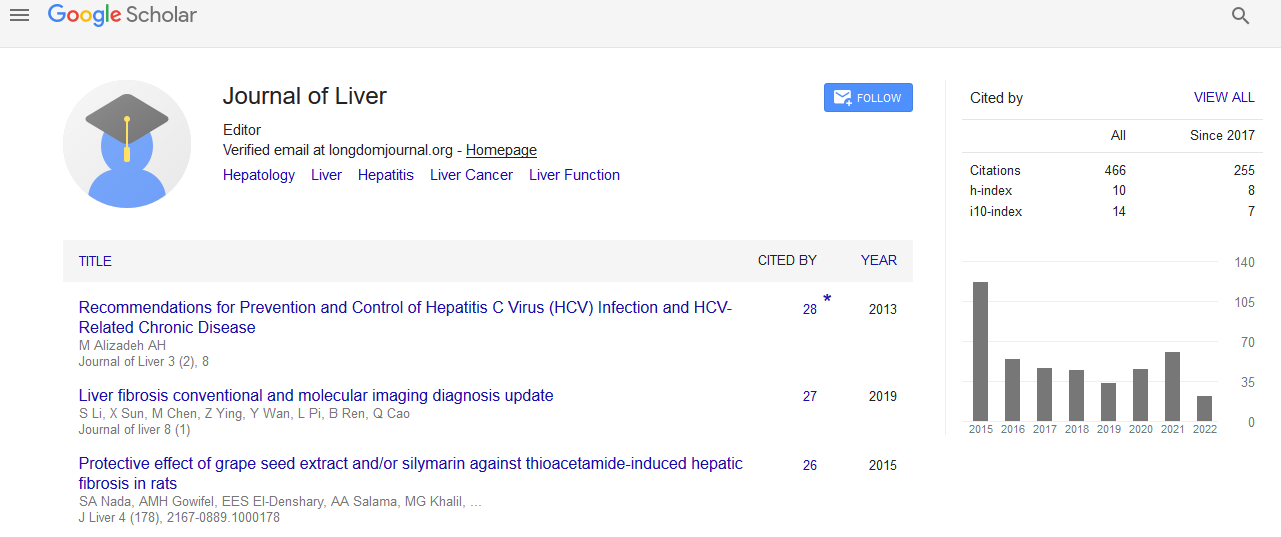PMC/PubMed Indexed Articles
Indexed In
- Open J Gate
- Genamics JournalSeek
- Academic Keys
- RefSeek
- Hamdard University
- EBSCO A-Z
- OCLC- WorldCat
- Publons
- Geneva Foundation for Medical Education and Research
- Google Scholar
Useful Links
Share This Page
Journal Flyer

Open Access Journals
- Agri and Aquaculture
- Biochemistry
- Bioinformatics & Systems Biology
- Business & Management
- Chemistry
- Clinical Sciences
- Engineering
- Food & Nutrition
- General Science
- Genetics & Molecular Biology
- Immunology & Microbiology
- Medical Sciences
- Neuroscience & Psychology
- Nursing & Health Care
- Pharmaceutical Sciences
The role of dicer in hepatitis B virus (HBV)-related hepatocarcinogenesis
2nd International Conference on Hepatology
May 09-11, 2016 Chicago, USA
Kai-Fu Tang
The First Affiliated Hospital of Wenzhou Medical University, China
Scientific Tracks Abstracts: J Liver
Abstract:
Hepatitis B virus (HBV) infection is one of the major causes of hepatocellular carcinoma (HCC), but the molecular mechanisms underlying HBV-related HCC are still incompletely understood. Knockout of Dicer in hepatocytes led to spontaneouse HCCs, we found that Dicer is downregulated in the liver tissues of chronic hepatitis B patients and HCC tissues. Therefore, we proposed that decreased Dicer expression is critical for the development of HCC. Here, I will address the molecular mechanism underlying why Dicer downregulation lead to the development of HCC. Firstly, Dicer is essential for the maintenance of genome stability, decreased Dicer expression causes DNA damage, which may induce gene mutation and lead to carcinogenesis. Secondly, Dicer interacts with SIRT7 and holds a proportion of SIRT7 in the cytoplasm, decreased Dicer expression leads to H3K18 hypoacetylation upon DNA damaging. H3K18 deacetylation is critical to the maintenance of oncogenic transformation. Therefore, Dicer may participate in carcinogenesis via regulating H3K18 deacetylation. Thirdly, Dicer processes 7SL RNA into small fragments, which function as dominant-negative regulators of the full-length 7SL RNA, and interfere with signal recognition particle (SRP) complex formation. Decreased Dicer expression enhances SRP-mediated protein targeting, and increases hepatitis B surface antigen (HBsAg) secretion. HBsAg repress MICA and MICB expression via induction of cellular miRNAs in HCC cells. Therefore, Dicer may participate in antitumor immune response. Fourthly, Dicer may regulate tumor development via different miRNAs.
Biography :
Kai-Fu Tang has completed his MD in 1995 from Chongqing Medical University and PhD from Chongqig University. He is the Director of the Digestive Cancer Center of Wenzhou Medical University. He has published more than 30 papers and has been serving as an Editorial Board Member for several journals.
Email: tang_kaifu@aliyun.com

